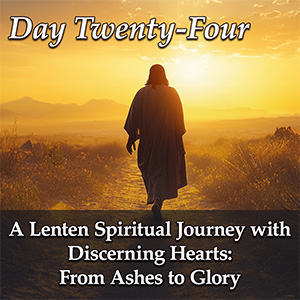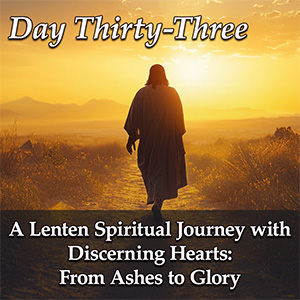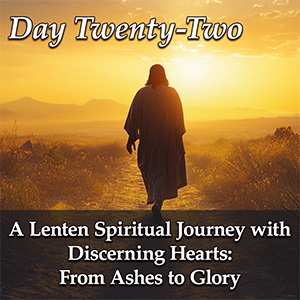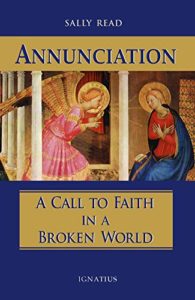Podcast: Play in new window | Download (Duration: 7:53 — 5.5MB) | Embed
Subscribe: Apple Podcasts | Spotify | Amazon Music | Android | Pandora | iHeartRadio | JioSaavn | Podchaser | Gaana | Podcast Index | Email | TuneIn | Deezer | Anghami | RSS | More
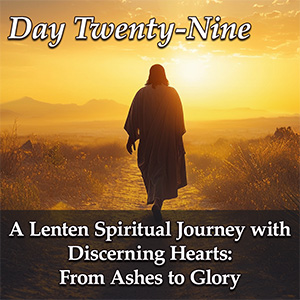
A Lenten Spiritual Journey with Discerning Hearts: From Ashes to Glory – Discerning Hearts Podcast
Day 29: Written on His Heart
Scripture Reading:
Isaiah 49:8–15
Thus says the Lord: In a time of favor I answer you, on the day of salvation I help you; and I have kept you and given you as a covenant to the people… They shall not hunger or thirst, nor shall scorching wind or sun strike them down… For the Lord comforts His people and shows mercy to His afflicted. But Zion said, “The Lord has forsaken me; my Lord has forgotten me.” Can a mother forget her infant, be without tenderness for the child of her womb? Even should she forget, I will never forget you. See, upon the palms of My hands I have written your name.
Reflection:
Today, Isaiah gives us one of the most tender revelations of God’s heart: even if a mother could forget her child, God cannot and will not forget us. “See, upon the palms of My hands I have written your name.” This is not poetic sentiment. It is a divine promise.
So much of Lent is a return to this core relationship: Are we living in the Father’s love? Are we cooperating with His mercy? Do we trust that our identity is secure, even when life is uncertain or painful?
Sometimes in the journey of faith, especially in the quiet or hidden seasons, we wonder if God sees us. If He remembers. If He cares. Isaiah answers this ache not with a demand, but with an image of mercy so intimate it silences our fear. God has etched us into His very being.
When we forget who we are, we lose the freedom to surrender, to discern, or to act with confidence. This is why Lent begins with a return to prayer and continues with purification—because from that place of belonging, we are made ready for deeper communion, deeper trust, and deeper love.
From this place of belonging, we also begin to hear His voice more clearly. Discernment is not first about decision-making—it is about relationship. When we know we are loved, we become more open to where God is leading. We are not guessing at His will from a distance, but listening to the One who walks beside us.
Whether we are facing a major decision or simply seeking to grow in daily faithfulness, discernment flows from the soil of prayer. When we return again and again to silence, to Scripture, and to the sacraments, our hearts become more attuned to the subtle movements of grace. In this way, Lent becomes a school of the heart—a time of listening, receiving, and being formed for mission.
The Church gives us so many ways to return: in silence, in the sacraments, in Scripture, and especially through the prayerful reading of the Word. One simple way to experience this is through Lectio Divina, the slow, prayerful listening to the daily Gospel. On Discerning Hearts, the Daily Lectio Divina podcast offers Scripture proclaimed three times with gentle reflective prompts. These gentle words invite listeners to open more deeply to God’s presence in the Word. It is not just about hearing the Word—it’s about listening and receiving it, in the very places we didn’t even know were closed.
St. Teresa of Avila, a great teacher of prayer, wrote:
“Mental prayer is nothing else than an intimate sharing between friends. It means taking time frequently to be alone with Him who we know loves us.” (The Life, ch. 8)
And from the Desert Fathers, Abba Isaiah reminds us:
“Unless the heart is humble, it cannot bear fruit in reading the Scriptures.” (Apophthegmata Patrum, Isaiah 3)
Let us anchor ourselves in the truth: before we can do anything for God, we must remember who we are to God. We are written on His hands.
Reflection Questions:
- Do you believe God sees and remembers you? Why or why not?
- How might your relationship with God change if you rested more deeply in His love for you?
- What practices can you commit to that will help you listen more attentively to the voice of the Father?
Closing Prayer:
Lord, You have written my name upon Your hands. Help me to rest in that truth when I feel forgotten or afraid. Draw me deeper into Your heart through prayer, Scripture, and the sacraments. Teach me to trust that I am Yours, and from that place of love, lead me to do Your will with confidence.
Amen.
This reflection is written by Kris McGregor of Discerning Hearts®. The Scripture passage is taken from the Jerusalem Bible (1966 edition), used with permission. No unauthorized use or reproduction is permitted without prior written consent.

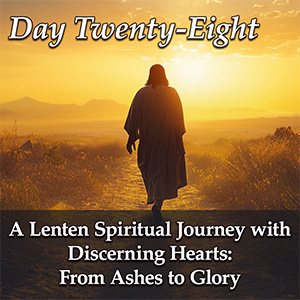
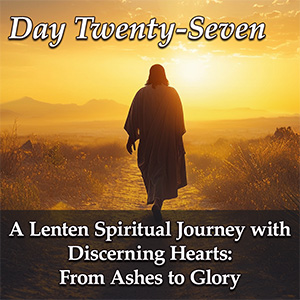
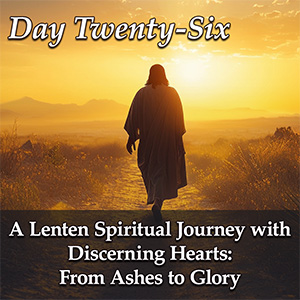
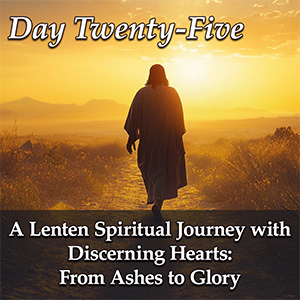

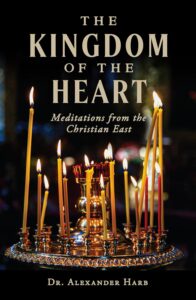 From the book’s description:
From the book’s description: